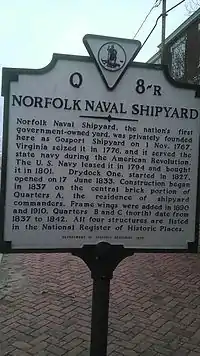Andrew Sprowle
Andrew Sprowle (c. 1714 – 1776) was a merchant, British naval agent, and landowner in Portsmouth, Virginia, best known for establishing the Gosport Navy Yard, which is currently known as Norfolk Naval Shipyard. Sprowle emigrated from Scotland to what is currently the Commonwealth of Virginia in the mid-18th century, where he lived until his death in 1776.
Andrew Sprowle | |
|---|---|
| Born | c.1714 |
| Died | 1776 (age 62) |
| Nationality | Scottish |
| Occupation | Merchant, naval agent |
| Known for | founding Gosport Navy Yard (now Norfolk Naval Shipyard) |
Early life
Sprowle, after emigrating from Scotland, settled in Norfolk Borough around 1746, where opportunities for wealth were available in the soon-developing town of Portsmouth.[1]
Sprowle's appearance remains unknown, owing to the fact that no portrait exists,[1] however his family history is available in "Eight Centuries of the Spreull and Sproule Families".[2] With regard to his early years in Hampton Roads, only fragments of court records remain to list ships and property that he owned.[1][3]
Portsmouth, Virginia

Sprowle was well respected in the mercantile community, serving for 36 years as President of the Court of Virginia Merchants.[4] According to Norfolk County Court records, he was listed as a merchant of Norfolk Borough in 1746, and in 1752 purchased Portsmouth lots (numbers 11, 12 and 24) from William Crawford, acquiring other town lots and extending his holdings within a few years across Crab Creek with several waterfront tracts in Gosport, including part of the site of what later became the Gosport Navy Yard, and was still buying Gosport property as late as 1772.[3]
In 1763, Portsmouth underwent its first annexation, expanding the western boundary. The same year, an early governing body of Town Trustees were named, including Andrew Sprowle, George Veale, Thomas Veale, Charles Steuart, Humphrey Roberts, Francis Miller, James Rae, David Purcell and Amos Etheridge.[3]
Gosport Shipyard
Sprowle founded the Gosport Navy Yard in 1767 under the British flag.[5] The shipyard is now known as Norfolk Naval Shipyard, and is the United States Navy's oldest continually operating shipyard, predating the U.S. Department of the Navy by 31 years.[6]
Revolutionary War
Sprowle's contributions during the American Revolutionary War were largely to provide material support for the British Royal Navy.[3] Early in the War, the Elizabeth River was occupied by the ships of Lord Dunmore, Royal Governor of Virginia, where Dunmore was hosted by Sprowle, a personal friend and Tory supporter (Loyalist),[3] at his residence, resulting in Gosport being "virtually the Royal capital of Virginia."[3]
On the defensive, Dunmore established martial law and fortified his position in Virginia. He was later driven from the area by the Continental Army during the Battle of Great Bridge (December 9, 1775).[7]
Death
Sprowle attempted to flee the Commonwealth of Virginia on May 25, 1776, after it fell to the Continental Army, but was unsuccessful.[8][9] Following Dunmore's retreat from Portsmouth in May 1776, Sprowle was exiled along with other Royalists to Gwynn's Island (now Mathews County, Virginia), where he died five days thereafter and was buried in an unmarked grave.[8][9]
References
- Flanders, Alan (11 January 1998). "Shipyard Founder's Identity Hidden by Mist of Time". The Virginian Pilot.
- Sprowle, James (23 August 2017). Eight Centuries of the Spreull and Sproule Families. ISBN 9781975670542.
- Butt, Marshall (1971). Portsmouth Under Four Flags, 1752-1970. Portsmouth Historical Association & the Friends of the Portsmouth Naval Shipyard Museum. pp. 8–15. ASIN B002J05TJQ.
- Dupuy & Hammerman (1974). People & Events of the American Revolution. R.R. Bowker Company. p. 407. ISBN 978-0835207775.
- "Andrew Sprowle at Markers of History". Archived from the original on 26 August 2011. Retrieved 8 February 2013.
- "History Roots". United States Navy. Archived from the original on 26 January 2012. Retrieved 8 February 2013.
- Willyard, Kyle. "The Battle of Great Bridge". The Continental Line. Archived from the original on 14 September 2007. Retrieved 9 February 2013.
- Flanders, Alan (6 Nov 1994). "Fiery Widow Fired a Parting Shot at Dunmore". Virginian Pilot.
- Flanders, Alan (10 February 2002). "Andrew Sprowle's Widow Lost it All, Including Her Good Name". Virginian Pilot.
External links
- "Andrew Sprowle". Markers of History. Archived from the original on 2011-08-26. Retrieved 2013-02-09.
- "History Roots". United States Navy. Archived from the original on 2012-01-26. Retrieved 2013-02-09.
- "Andrew Sprowle, died, c.1776 - Sprowle - Family History & Genealogy Message Board - Ancestry.com". Ancestry.com.
